Leadership in Running Fitness
My day at the British Athletics course

On Saturday morning, I bumped into Iva Barr. At 86, she's the oldest female runner in the London Marathon, and therefore about as far from being a beginner as it's possible to be. And yet whenever we see her, she's always encouraging, and shares her positivity with us.
I was on my way to the day-long Leadership in Running Fitness course from British Athletics, so it was a perfectly timed reminder that experienced and enthusiastic runners can have a huge impact when it comes to inspiring beginners and novices.
With a few years of running under your belt, sharing your experience can really help others. If you've ever thought about leading a group of runners, or getting involved with coaching at your club, the course is certainly billed as a decent place to start. I thought I'd share my own experiences of tackling the LiRF course, in the hope that it will help you decide whether it's something for you.
I had several reasons for attending the course. I'd seen my lovely wife lead a group of beginners from their respective couches to their first 5k, and they're now tackling ten milers and half marathons - and it's been an immensely rewarding process for her. I've also been putting together some pages for beginners - it's a long time now since I started running, and so I thought it would be good to help me look at running from a beginner's perspective again.
All in all, I was a bit nervous as I finally found the right meeting room. Seven years of working from the comfort zone of home isn't especially conducive to standing up in front of strangers and telling them how to exercise. Our day began with an arc of chairs surrounding a flip chart, with the ladies congregated on one side, and the men on the other - a bit like an old-fashioned dance. But it soon felt more like an episode of The Apprentice, as we were broken up into teams and asked to brainstorm ideas about the essential components of a typical training session. You'll be pleased to know that cake was mentioned!
Although we started out in a similar fashion to most corporate courses, there were some critical differences. Firstly, we weren't falling asleep whilst someone from middle management talked us through the new system for booking annual leave. We were talking about RUNNING! And secondly, we didn't stay sitting down for long.
There was a lot of theoretical stuff take in - discussing the role of a leader; planning and delivering a variety of sessions; making them fun; making them safe; organisation; flexibility and stretching; components of performance and fitness; understanding and targeting energy systems; recovery; defining goals; dealing with injuries; dealing with prejudices; youth development; and perhaps most importantly, ensuring an inclusive style of leadership that focuses on individuals.
If you've been running for a few years, then the chances are that you've probably absorbed quite a bit of this stuff, even if you haven't put it into a formal structure, or taken the time to think about everything you've learnt. Needless to say, our entire group were all runners, and there was never a shortage of answers when the lecturer was posing the questions. In fact, there were moments when I wanted this bit to go a bit quicker.
But there's a massive difference between being able to recall all this stuff within the comfort of the classroom, and being able to master it when leading other runners. Within an hour, we were standing on the infield at the running track in small groups, taking turns to lead each other through warm-up exercises that we had to make up on the spot.
Imagine you're a novice beekeeper, and your beekeeping sensei has just opened the hive, banged the side with a rolled up newspaper, and told all the bees that you're the new queen. Oh, and you've forgotten your costume. And your brain seems to have been stolen. And the sensei is standing behind you telling you pointing out everything that you're doing wrong. There's an instantaneous realisation that careful planning and reducing complexity is the way to avoid getting stung.
The emphasis throughout is on mastering the basics of effective group management, through simplicity, clarity and good communication in both directions. And as if to prove a point, the moment that has stuck in my mind was a simple one. We were asked to observe some runners who had been told to imagine they had helium balloons attached to their heads. The results were thought-provoking - they didn't just run with a more upright style - they also opened up their shoulders, which in turn got arms pumping harder. A simple instruction can have a far-reaching impact.
The course materials do their bit to help boil the essentials down to the core components you need. There are flash cards on various topics, from safety to technique, to stretching - each containing bullet-pointed reminders of the key things to remember. However, it's hard to imagine following every single recommendation. For example,when demonstrating stretches, it's suggested that the leader should remain silent, so the onlookers can concentrate on the position of arms and legs. I think this is debatable, or at least unlikely for me, as a chattering Welshman who can never end a sentence without making a head start on the next one. But by setting out a framework, it does ensure that would-be leaders come away in a position to consider the wide range of elements that go into leading a group - and in doing so, the course achieves everything it promises.
Since completing the course, I've started leading a small group of parents at my son's school, tackling Couch to 5k. Completing the LiRF course and getting your license gives you insurance to lead a group, and access to additional resources to help inspire and look after your runners (although you can get lots of similar stuff on Fetch). I came away from the first session with a big grin on my face. All my beginners had done really well, pushing themselves out of their comfort zones, leaving me glad that I'd pushed myself out of mine.

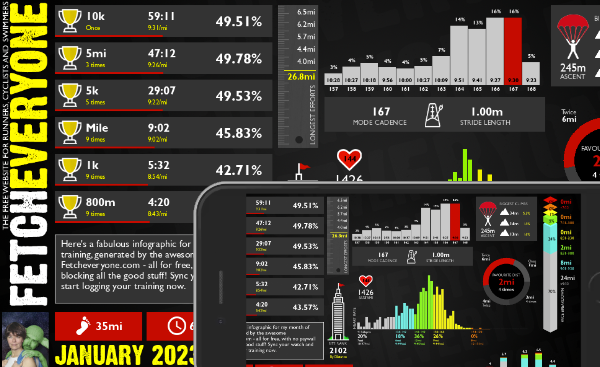
Monthly Summary
A brand new shareable infographic showing a colourful breakdown of your training month.

Marathon Prediction
We delve deeper to give you greater insights when working out your goal marathon time.
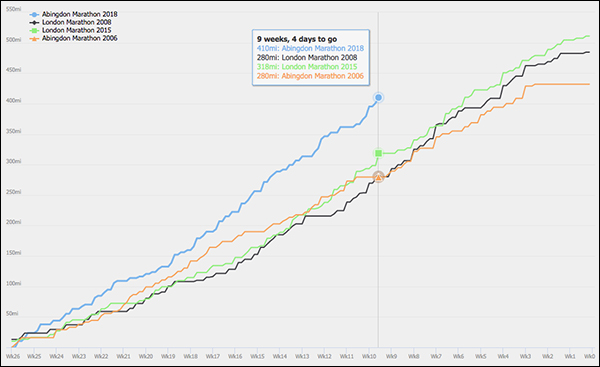
Pre-race Training Analysis
See your accumulated mileage in the weeks leading up to any event in your portfolio, and compare it to your other performances

Your 365 Day Totals
Peaks and troughs in training aren't easy to find. Unless you use this graph. Find out what your peak training volume really is
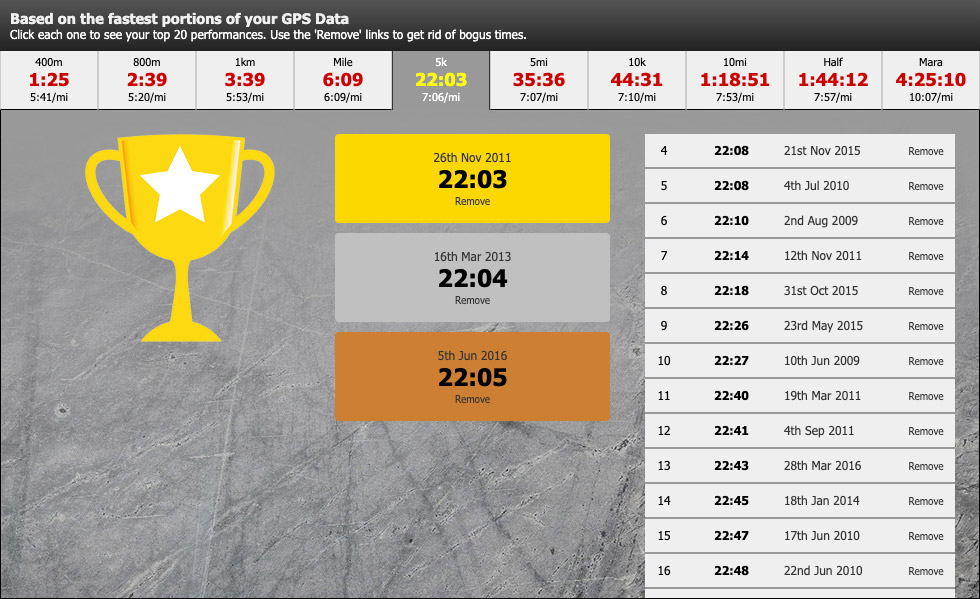
Benchmarks
See the fastest portions from all your training runs. Filter by time to give you recent bests to aim at. Every distance from 400m to marathon.
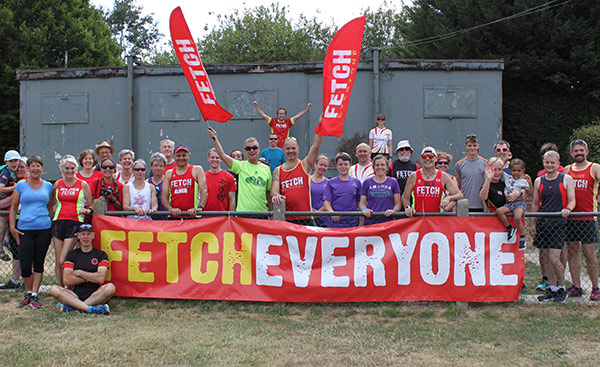
Fetch Everyone Running Club
Join our UKA-affiliated club for event discounts, London Marathon ballot places, the chance to get funded for coaching qualifications, and a warm feeling inside.

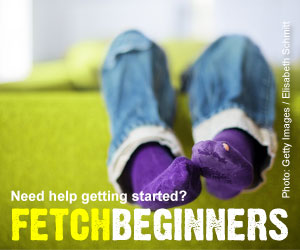
Leave a comment...
-
This experience of LiRF chimes very much with mine - I remember the helium balloons experiment too! I'd also agree with the silent demo technique issue - I find I have to talk my beginners through the stretches or they don't do them effectively. I am loving my beginners' group already - 2 weeks in, seeing their sense of achievement and triumph is giving me as big an endorphin high as getting a PB!!
Autumnleaves
-
Great stuff, fetch

fleecy
-
Thanks for this article, Fetch. I'm thinking about this course as a way of putting something back in to running (not to mention a way of keeping a link with running when I'm a bit injured or a bit old and cream crackered LOL). I think at the moment I realistically have too much stuff on the go to take this on and should at least get the London Marathon out of the way before I go forward, but it gives me an idea of what to expect, which is really helpful. Cheers
StorksRock
-
Great article. I am thinking about doing the Scottish Athletics one, and possibly taking some groups at work. Will be fun to see if this comes to pass! Well done you for taking it on.
 G
G
HappyG(rrr)
-
Coaching beginners is incredibly rewarding, well done Fetch and to any else out there thinking about giving it a go, do so, you won't regret it
Old Man
-
I did this in November and loved it, it is brilliant taking groups.
Joopsy
-
Tells it like it is. Well drafted Fetch. In Scotland, the jogscotland programme (and associated leaders 1 day course) takes folk along a structured journey which really works

jiminy cricket
-
Thanks for sharing this.. something I really want to do too. Just need to actually get myself motivated to do it!
Yazoo
-
Great piece, Fetch. I am doing my course this Sunday, so now know what to expect. Thanks !!
Clatters
-
I did this a few years ago, and everything you say chimes with what I remember about it - all pretty positive! I did it because we wanted to start a beginners' group at my running club. We've since run two beginners' groups, and some of those folks have become active members of the club and are now running marathons! Hoping to get another beginners' group off the ground (the helium balloons will help with that
 ) later in the spring - come to think of it, that was one of my 'to do' things from the last club committee meeting, so better start planning again ...
) later in the spring - come to think of it, that was one of my 'to do' things from the last club committee meeting, so better start planning again ... 
Schnecke
-
Yep, great summary of what it's like. Cheers, Fetch!
Fat Dave
-
Doing my LiRF was brilliant, so much so I took on and passed the CiRF in November. My story has also been featured by England Athletics: wp.me
running_dan_w
-
I attended a Leadership In Running Fitness course in November at the NIAC Cardiff, the tutors were all top athletes - James Thie, Joey Duck and Chris Moss, they were excellent. My misgivings are down entirely to the fact that I'm a highly sceptical person especially in terms of advice on something as individual as running. You only have to look at the Fetch forum to see all sorts of fad and outright superstition touted as fact. I am cursed by curiosity and I read widely so for instance when I see repeated high-quality research that demonstrates that stretching doesn't really achieve anything it is very hard for me in a coaching role to encourage people to do this. Maybe I am the wrong kind of person to be in the role I have concluded.
The_Saint
-
I think that's the point that I'm making in my penultimate paragraph - namely, that the course gives you an overview of all the things that you need to consider - but ultimately, it's back to you regarding how you choose to implement those guidelines - and indeed, whether you choose to follow them or not. Also, to be fair, I don't recall there being many contentious issues raised during the course - the majority was about harnessing common sense. Would be interesting to see the link re: stretching being ineffective.
fetcheveryone
-
I shared your article on my running club's Facebook page - I'd love some more of our members to do the course and give something back to our club too.
Lalli
-
Hi Fetch, as stretching is such an emotive issue and many people earn a living from among other things promoting stretching you can find any evidence you like to support whatever conclusion you like but to my eyes a balanced reading of everything suggests that if there is an effect, it is very small to negligible but naturally there is a strong placebo effect. Example analysis
The_Saint
-
But even if physical effect is small, but the psychological effect is strong, doesn't that contradict the suggestion that it 'doesn't really achieve anything'? Anyway... as I've said, I think it's down to personal choice (I don't stretch, as a rule), but I wouldn't want to sidetrack the many positives of the day with the emotiveness of stretching. I could just as easily have mentioned headphones
 Perhaps the stretching debate needs its own article. Are you up for representing the 'NAY' vote in that?
Perhaps the stretching debate needs its own article. Are you up for representing the 'NAY' vote in that?
fetcheveryone
-
This depends on what you understand by Placebo and how comfortable you are going along with something where you are not at all convinced by the evidence. I don't really see it as a taking sides issue, as one of the links I was looking at earlier mentioned, there isn't actually a scientific basis for a mechanism by which stretching would work, rather an idea that moving something a bit gradually is better than moving it rapidly from a standing start. The thing is though, millions of years of evolution always seems to beat ideas.
The_Saint
-
I did the course last December and thoroughly enjoyed it and I will like to do the next course coaching beginners
Toks
To comment, you need to sign in or sign up!ncbi.nlm.nih.gov
bmj.com
The original large scale study casting doubt on the effectiveness was done by researchers from Sydney University on 2600 Australian Army soldiers.